
Three Years “Challenging the Ugly Face” of Domestic Violence
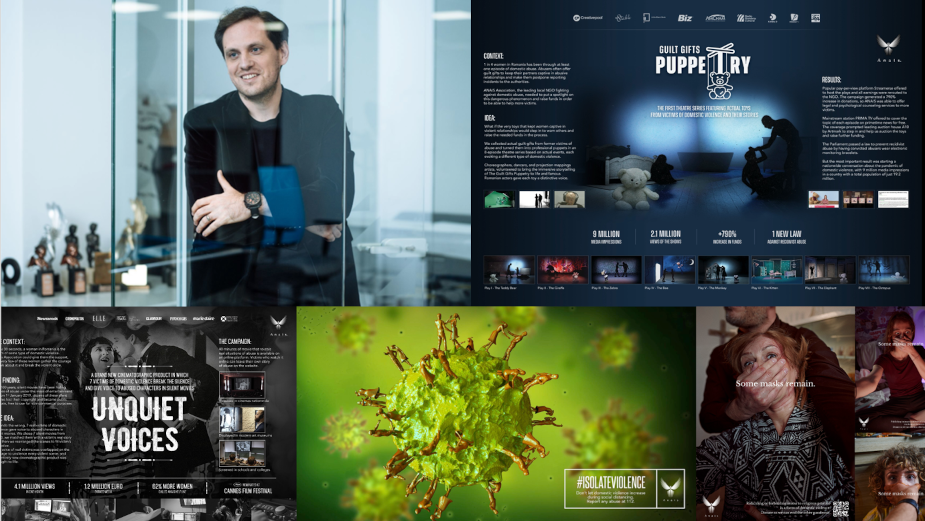
Creative agency Cheil Centrade has been working with ANAIS, the anti-domestic violence association for three years now. In that short space of time they’ve done some great work together, including the award-winning ‘Unquiet Voices’, ‘Isolate Violence’, ‘Guilt Gifts Puppetry’ and the most recent campaign ‘Some Masks Remain’.
As a body of work, it’s impressive how much difference these campaigns have been able to make in raising support for the charity and attempt to protect women from domestic violence in Romania.
LBB’s Alex Reeves spoke to executive creative director Mihai Gongu about the journey the client and agency have been on together to achieve this.
LBB> When did Cheil Centrade's relationship with ANAIS begin?
Mihai> Our relationship with ANAIS began in 2019 when they approached us to help them raise funds to keep open the Invicta House, the only space in Bucharest open 24 hours a day offering free shelter to victims of domestic abuse. Little did we know back then that it would grow to become one of the most solid client-agency relationships in the local market and that it would raise such overwhelming support throughout the years for the fight against domestic violence in Romania, from the creative industries, the mainstream media, and numerous celebrities and key opinion leaders, as well as society in general.
LBB> What were the charity's priorities then? And what were the realities about domestic violence in Romania?
Mihai> The charity’s priorities were, same as today, to advocate, raise awareness, and drive change in Romanian society by promoting women’s unalienable rights to personal safety and freedom. ANAIS Association gathered an ambitious team of lawyers, psychologists and counsellors who dedicated their time and resources to the victims of domestic violence and invited Romanians to become actively involved in supporting the cause and create the pressure needed for changing policies and local legislation to the keep Romanian women safe from all forms of abuse.
Domestic violence is unfortunately a very serious matter in Romania. An extensive research project led by the United Nations entitled ‘Global Study on Homicide. Gender-related killing of women and girls’ revealed that, in Romania, in 2019 alone, over 20,000 women were hit in their own homes and 44 died as a result of the beatings.
The harsh reality was that every 30 seconds a Romanian woman faced one form of abuse, while three out of 10 women declared they have been physically or sexually molested at least once in their lives.
The roots of this sickening phenomenon run deep as in 2016, Romania occupied a shameful first place among the EU countries in the Eurobarometer ‘Gender Based Violence’ in justifying sexual abuse on ‘the victim’s provocative clothing’ or ‘unconvincing resistance’ and believing that ‘some physical corrections’ are part of the routine of a normal couple.
LBB> What were the first steps you took together to try to change these realities?
Mihai> The most difficult part was finding a fresh approach to galvanise the key audience who could lead a national conversation for societal change - the educated public. We needed to capture their attention and inspire them to start debating the subject in a time when their attention was channelled to other more exciting things than the plight of domestic abuse. We decided that the best way to reignite the conversation is to leverage culture and create an innovative piece of entertainment bound to get everyone’s attention.
LBB> What insights led to the ‘Unquiet Voices’ campaign?
Mihai> Most silent movies shot at the beginning of the 20th century allowed domestic abuse scenes as pure entertainment. In Romania, the abuse of women had remained as silent as the movies themselves.
Broadly speaking, copyright protection expires in the US after 95 years. The practice of giving access to previous works is meant to benefit a new generation of authors, scholars, and inventors, who can use the classics as raw material for their own work. On January 1st 2019, dozens of silent movies became public domain.
We seized the opportunity to spark a conversation by turning the movies into a thought-provoking original content piece that would become viral and the ‘Unquiet Voices’ campaign was born.
We invited seven victims of domestic abuse to break the silence and give voices to abused characters in silent movies for the first time in 100 years. We took bits of footage from old silent movies, rearranged them to fit the victim’s real story and we overlapped their voices to unsilence every violent scene. The process itself was very time and especially emotionally consuming, but the result was something truly unique: a 40-minute long repurposed artistic film that broke the women’s silence once and for all.
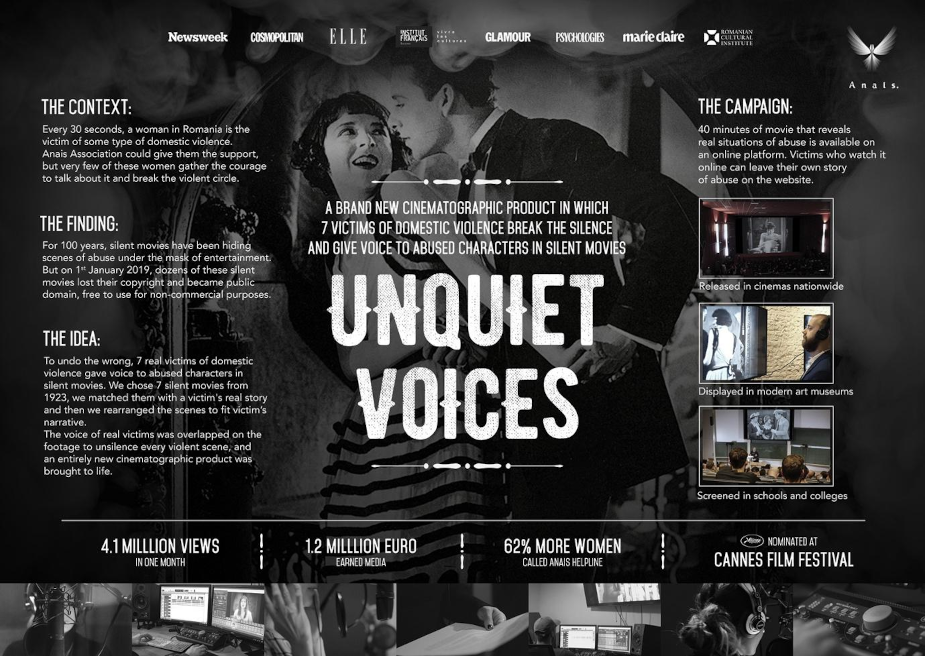
LBB> And what results did that initiative have?
Mihai> On International Women’s Day, the movie was launched on an online platform, followed by a nation-wide release in cinemas. It was displayed in modern art museums and screened in schools and colleges. The result was that it started a much-needed national discussion with dozens of public figures joining the cause and adding their support. The campaign also brought funds to ANAIS, for them to keep on fighting the good fight. Furthermore, ‘Unquiet Voices’ became educational material for the Romanian Court of Law and played a big part in the subsequent passing of several laws regarding domestic abuse.
LBB> When covid-19 hit, how did you choose the right way for a charity like ANAIS to respond?
Mihai> While social distancing did help Romania’s overburdened healthcare system, another dangerous virus was spreading in people’s homes. Domestic violence had registered a surge, as abusers spent more time in uninterrupted contact with their victims. Sometimes in the same room, as more than 55% of Romanians live in overcrowded homes. The income insecurity triggered by the economic crisis led to even more pretexts for violence.
According to a recent study, in the first nine months of the year, the number of requests for protection orders had doubled compared to the period before the pandemic.
We had to come up with a fast response that made sure the public opinion does not ignore this issue. But how do we raise the public’s attention when all the news channels only talked about the pandemic?
LBB> How did that thinking lead to ‘Isolate Violence’?
Mihai> It is unusual to think of social problems as competitors. But in a very real sense they are. People have a limited attention span and limited capability for empathy. There is only so much any of us can pay attention to and care about at any given moment. It’s human nature. At the time, the world was interested in one thing only: the covid-19 virus. Its origin, its spikes, its spread. Our only chance of getting the public to care about domestic violence was to harness their addiction to covid news. So, we hijacked the iconic visuals of 2020 – the spiked virus cell and the distribution curve – to deliver our own message in a series of online films and visuals.
We created stunning Key Visuals that, at first glance seemed to represent the covid-19 virus, but at closer inspection revealed dramatic scenes of domestic abuse depicted through the famous spikes on the virus shell.
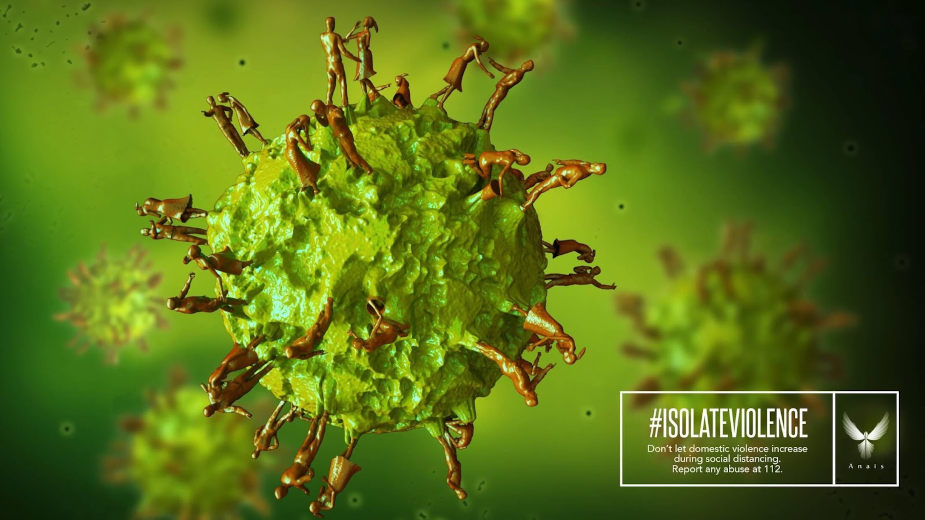
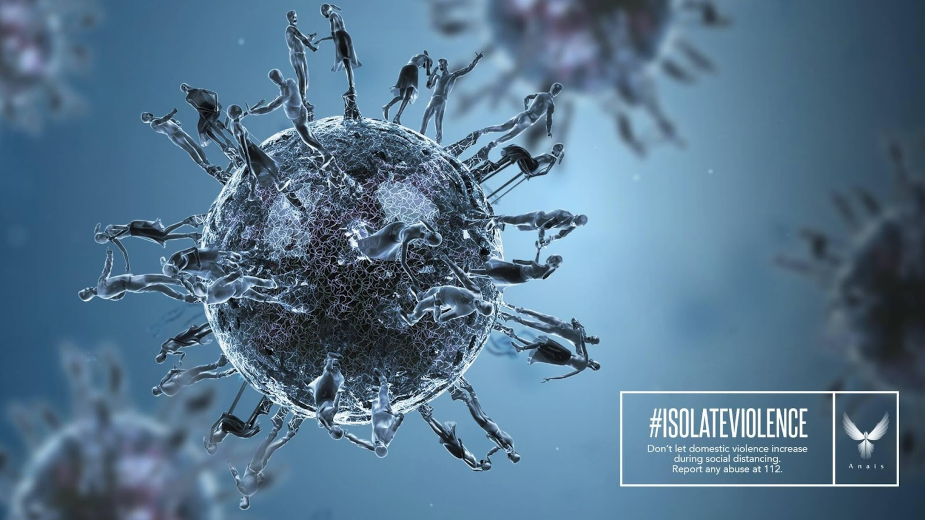
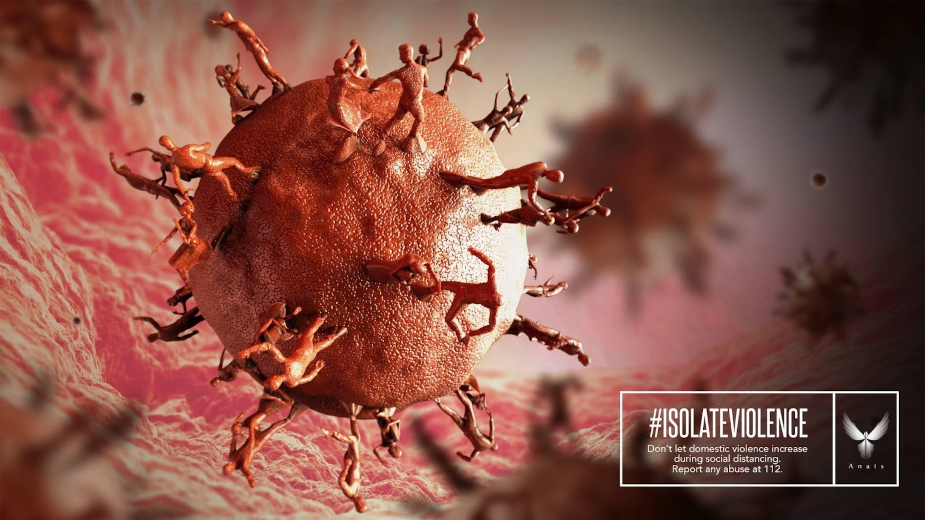
Similarly, we created short online videos that borrowed the ever present ‘flatten the curve’, ‘super-spreader events’ or ‘social distancing effects’ type of charts to grab people’s attention and then turned them into thought-provoking storytelling about the domestic violence pandemic.
The core of our initiative was the platform www.izoleazaviolenta.ro where various specialists offered advice ranging from legal counselling to practical tips for victims and their relatives during the lockdown. We organised a series of online live webinars with attorneys and psychologists, which could be accessed directly from the browser in incognito mode and could be closed just by pressing CTRL+W in case abusers would walk in on them.
The full story can be followed in the case film of the campaign:
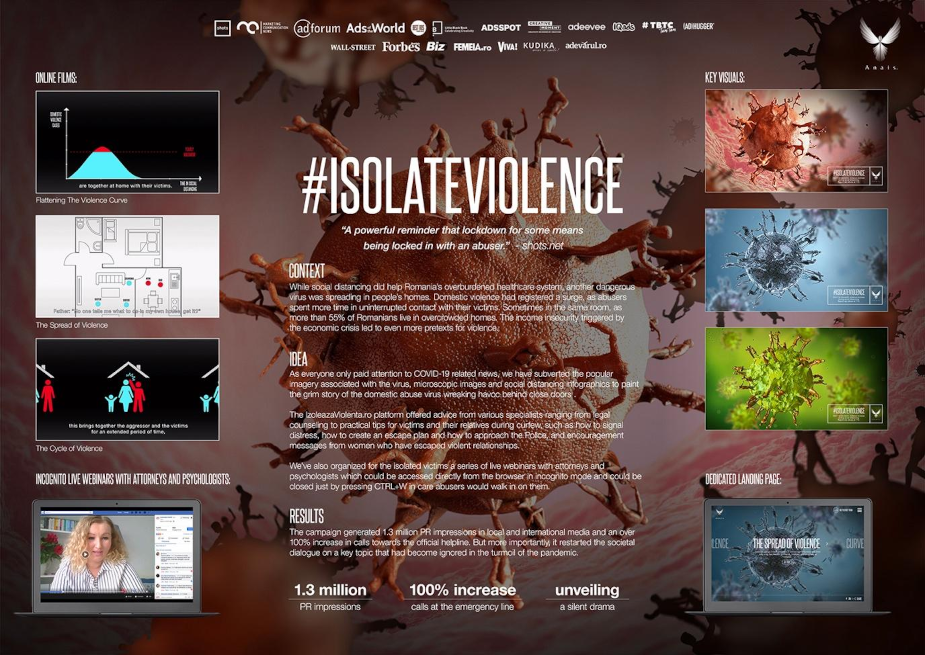
LBB> And then what was the first idea for ‘Guilt Gifts’?
Mihai> In 2021 we wanted to start an initiative around Valentine’s Day. Naturally, we gave a lot of thought to the practice of gift giving in abusive relationships and what it represents. During our research, we discovered a vile phenomenon called guilt gifting. Whilst in a healthy relationship a gift is the symbol of love and appreciation, in a toxic relationship, the aggressor takes advantage of their partner and manipulates them using gifts to make false promises and give the illusion of remorse, thus keeping them locked in a vicious loop where they fail to report the aggression, allowing abusers to relapse. Cute plush toys were keeping women captive so we asked ourselves: What if they could somehow redeem themselves and help women instead?
LBB> How did that evolve into the final campaign?
Mihai> The very toys that lured women to stay captive in abusive relationships were, thus, put to work to raise funds to help future victims of domestic abuse and raise awareness about the phenomenon. Our approach was to create a stirring content series where the protagonists are actual guilt gifts and the grim stories of abuse that they have witnessed and invite everyone to watch the series in exchange for a small donation.
‘The Guilt Gifts Puppetry’ is the first theatre series in the world where the protagonists are actual guilt gifts from victims of domestic violence.
We collected actual guilt gifts received by former victims of domestic violence and turned them into professional puppets that told the grim stories of abuse, as they happened in real life.
Choreographers, dancers, and projection mapping artists volunteered to bring the plays to life in a series of immersive shows that transported viewers in eight real-life scenarios, each evoking various types of domestic abuse from emotional to physical, from sexual to financial. Famous Romanian actors volunteered to give each toy a distinctive voice on stage.
Given the magnitude of the endeavour, we abandoned our initial goal to launch the campaign on Valentine’s Day, sticking to International Women’s Day instead.
As Carmen Nemeș, the president of ANAIS Association pointed out: “In Romania, the month of March is all about gifts towards women, however, not all gifts have good intentions behind. We would like women coming to us for help to realise that they deserve only gifts given out of love and respect. To know that they are not alone, that they can seek protection and that in fact, the most precious gift is to free themselves from a destructive relationship. Violence can never be justified, and their silence should not be bought with a gift.”
The first episode launched on Woman’s International Day on daruitdinvina.ro, and the campaign quickly took over the headlines. We teamed up with the leading local streaming platform Streamerse.net and all the earnings from the online tickets were directed towards the cause.
Leading mainstream channel PRIMA TV offered to cover the topic of each episode on primetime news for free. The coverage prompted leading auction house A10 by Artmark to step in and help us auction the toys and raise further funding in a dedicated public auction.
The pay-per-view mechanic was instrumental for the increase as the theatre plays registered 2.1 million views across all platforms.
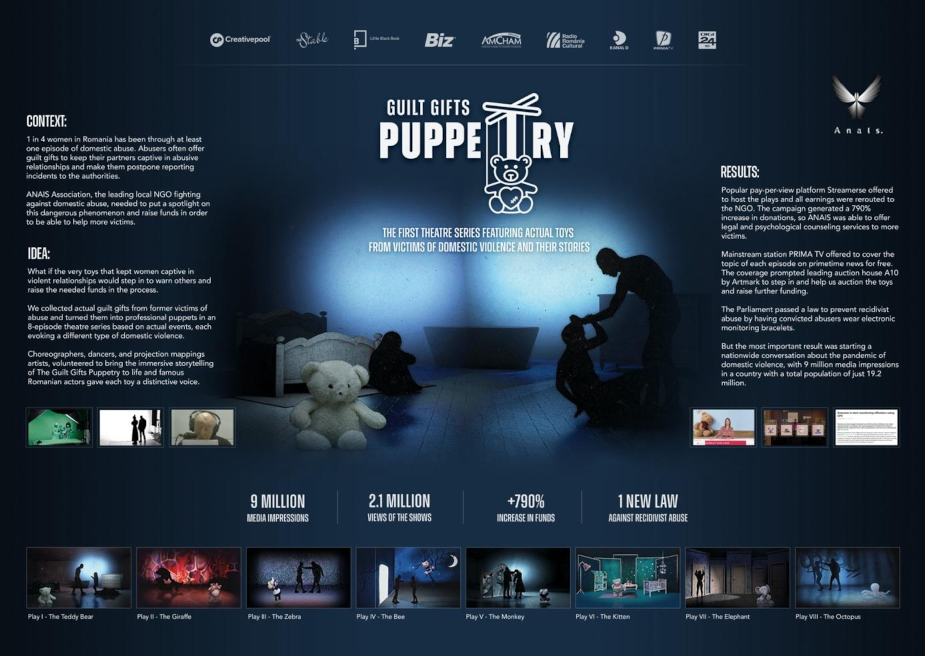
LBB> What impact did that campaign have on the use of ANAIS' services?
Mihai> The campaign more than tripled the number of calls to the ANAIS hotline, with many victims in need of psychological or legal counsel.
The campaign generated a 790% increase in donations compared to the previous campaign, so ANAIS was able to extend its legal and psychological counselling services to help more victims.
The Romanian Parliament passed a law to prevent recidivist abuse by having convicted abusers wear electric monitoring bracelets.
But the most important result was starting a nationwide conversation in Romania about the pandemic of domestic violence with nine million media impressions in a country with a total population of just 19.2 million.
LBB> Hijacking news about covid-19 was again the approach behind your latest work, right?
Mihai> On March 4th 2022, Romanian authorities announced that starting March 8th, all mask mandates will be lifted nationwide, as covid-19 cases have diminished. On March 8th, Romania celebrated International Women's Day together with the rest of the world.
In just three days, we developed a campaign that hijacked the breaking news about the mask mandates to raise awareness of the plight of the hundreds of thousands of Romanian women who will continue to have their noses and mouths covered. Either by the palm of an abusing partner or by their own palm, as they contemplate in disbelief the other pandemic still unfolding domestic violence in all its forms: from publishing intimate content without consent to prohibiting meetings with friends, from embezzling family income to forbidding access to religious practice or controlling a partner on the pretext of jealousy.
All the executions were based on real stories of domestic violence from Romanian women who had approached ANAIS Association, the leading Romanian NGO against domestic abuse, for psychological and legal counselling.
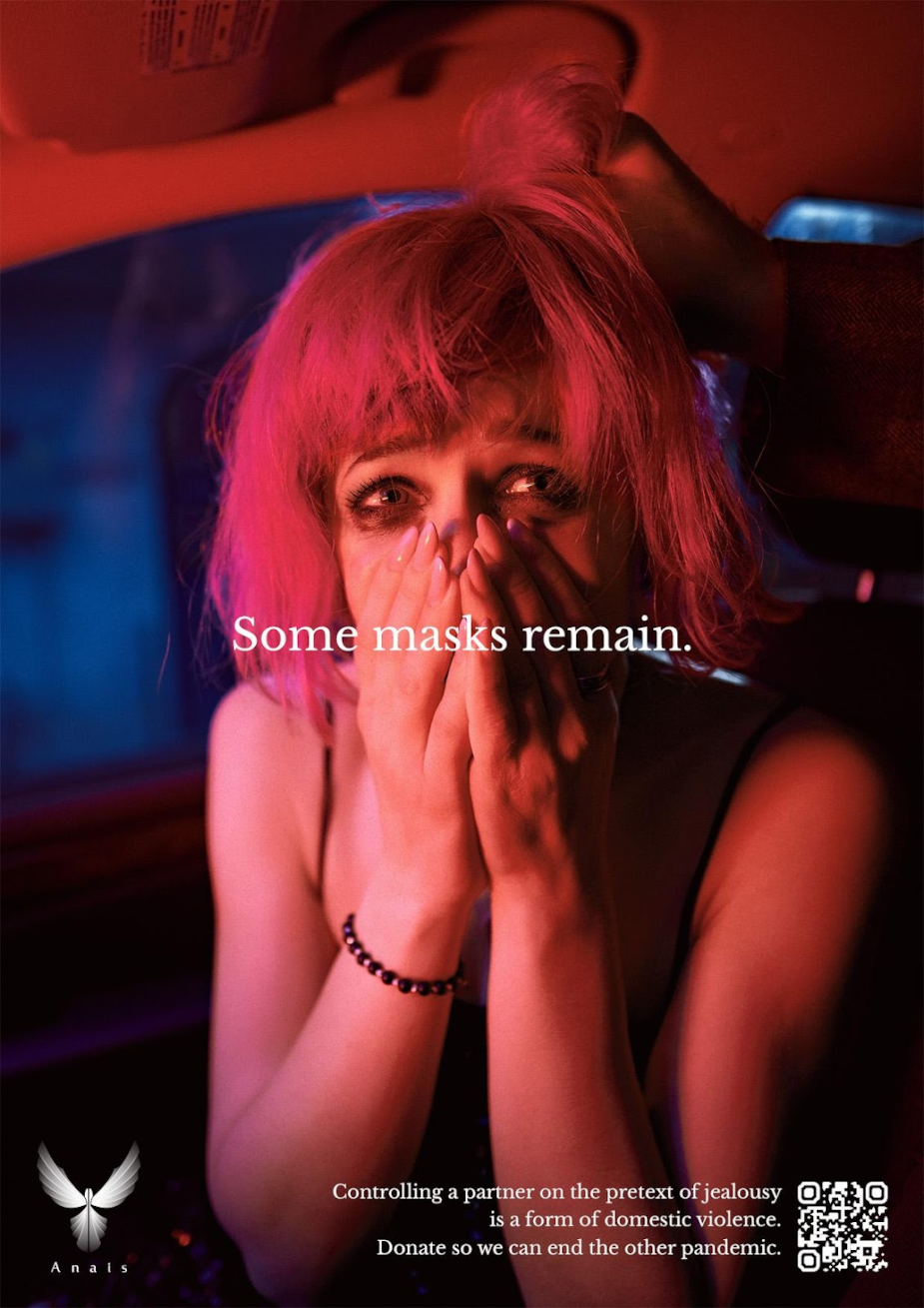
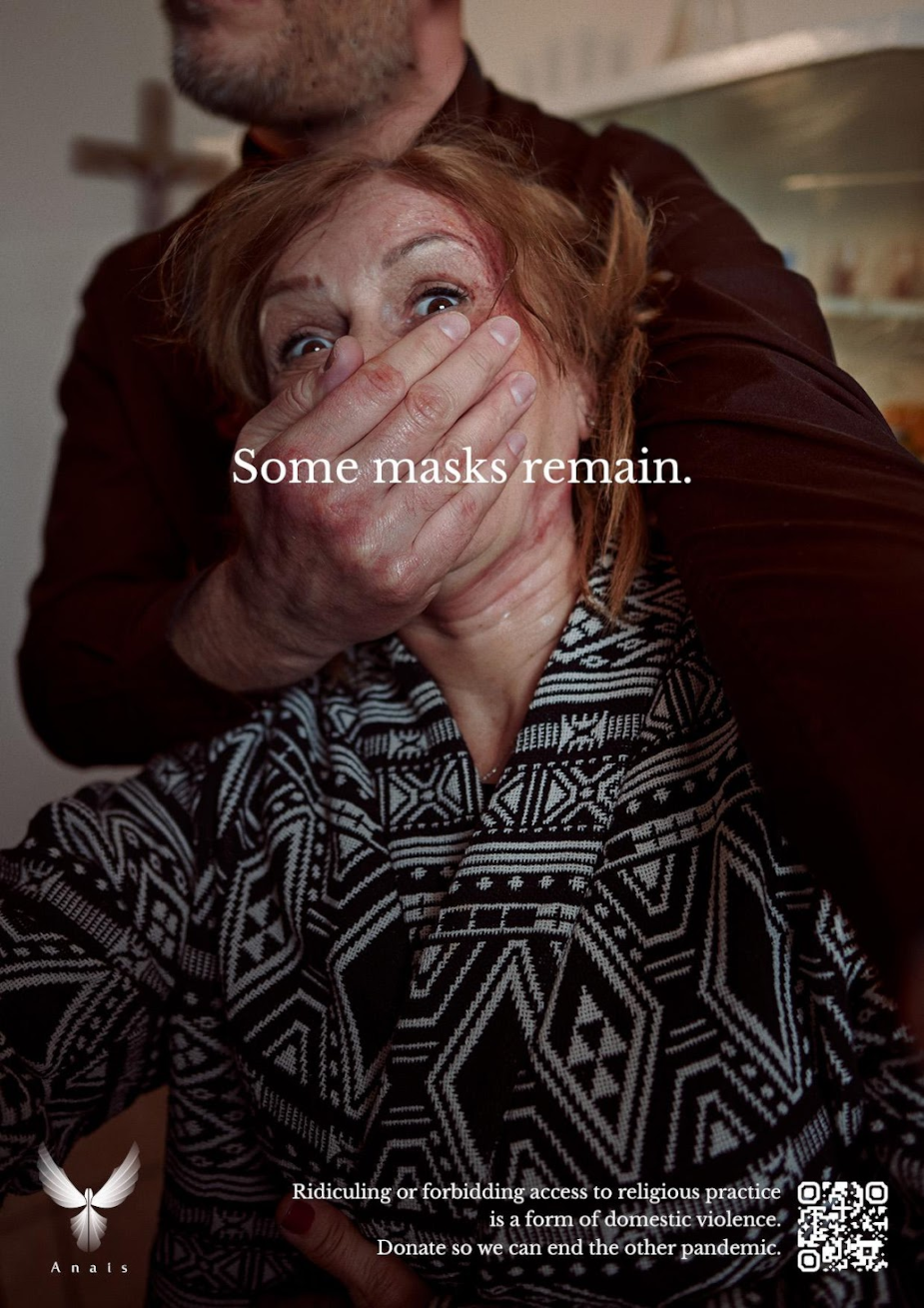
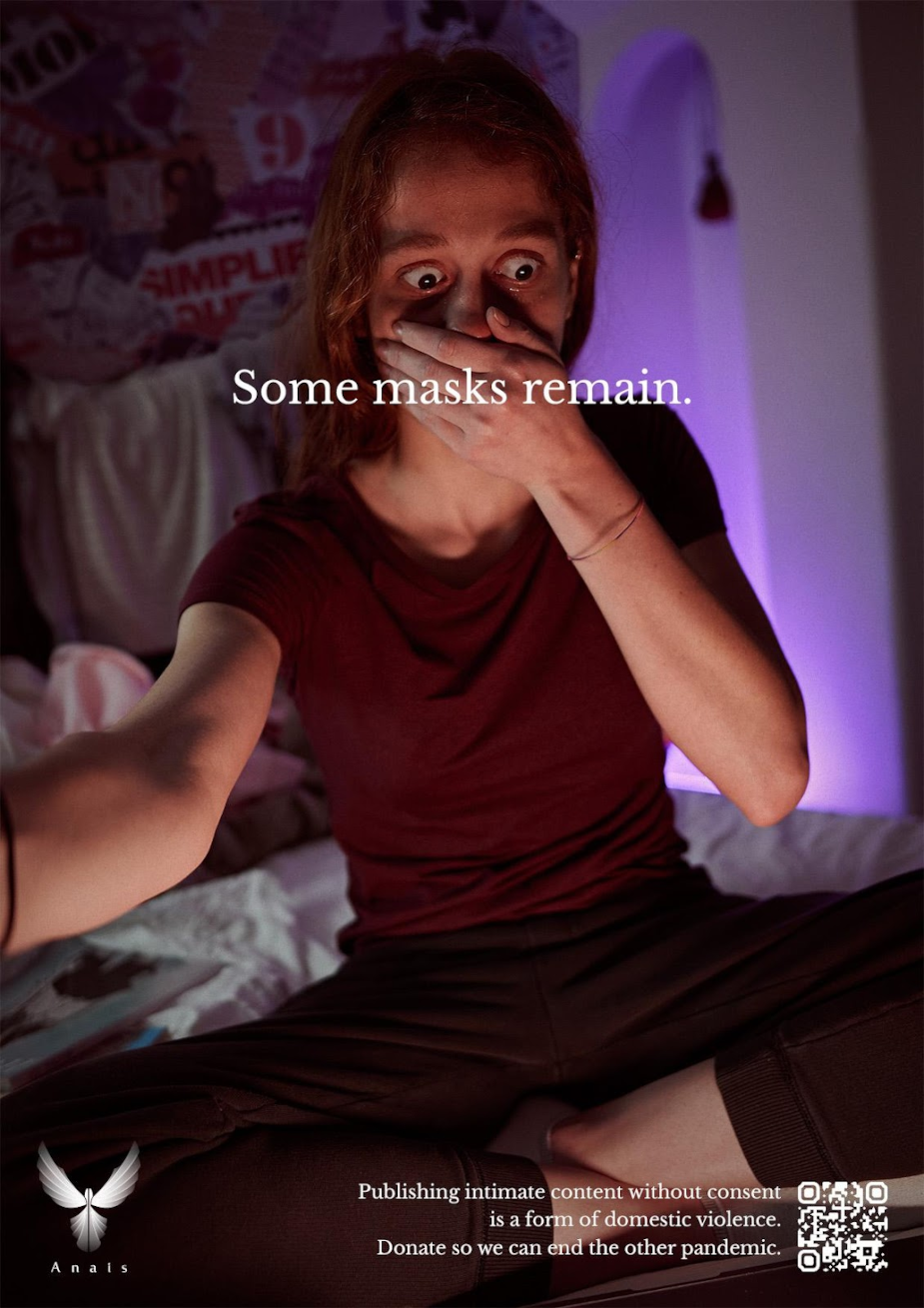
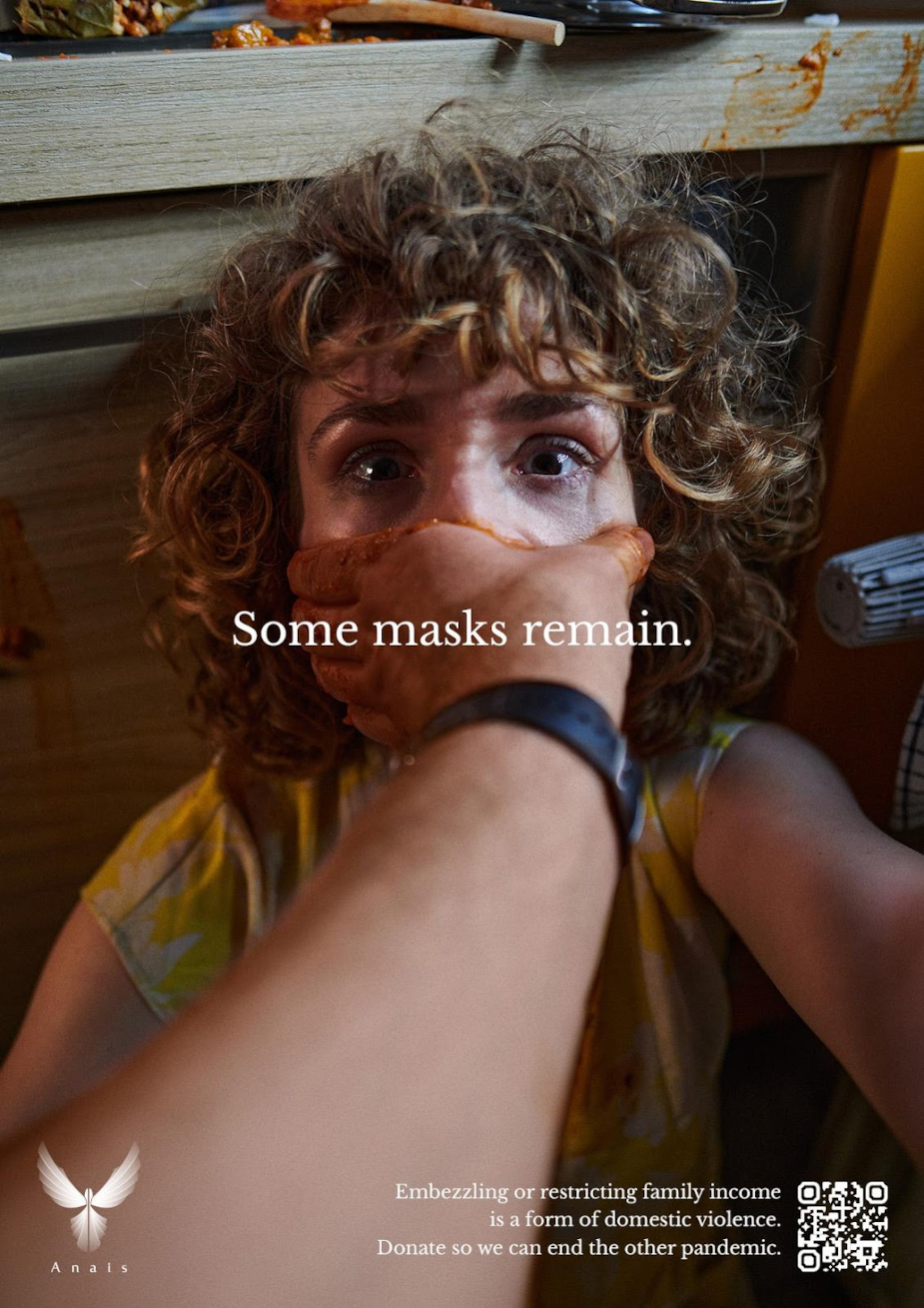
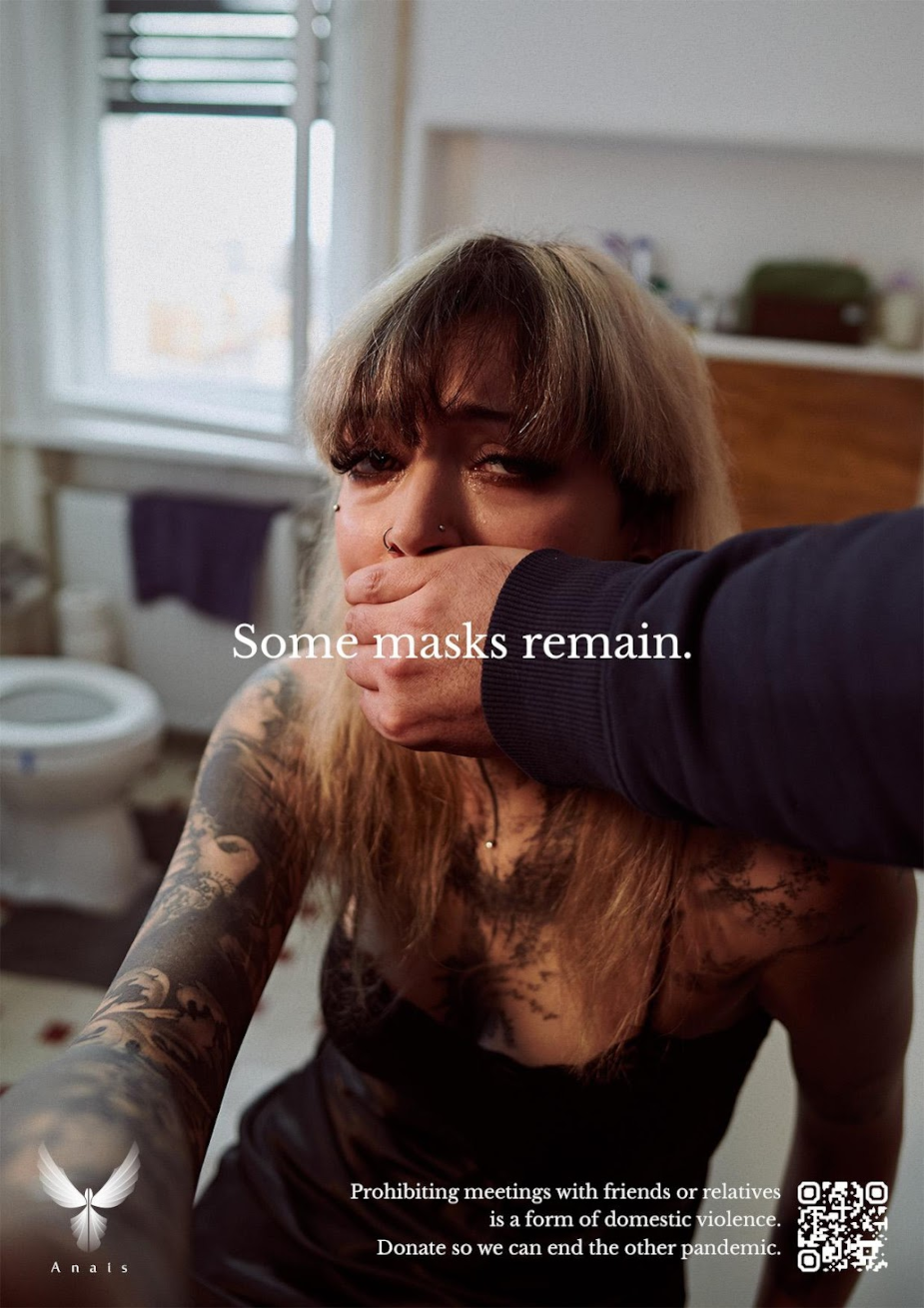
LBB> What have been the overall lessons the Cheil Centrade team has learned from working with ANAIS over the years?
Mihai> First and foremost, it has taught us the power that an engaging idea has to rally an army of big-hearted volunteers and make it real. We are very grateful to the hundreds of people who have stepped in across all these years to help us bring each campaign to life from production houses (StudioSet, Almost Ready), animation studios (Les Ateliers Nomad), theatre studios (Lightwave Theatre Company) or post-production studios (Chainsaw Europe), auction houses (A10 by ArtMark) or media companies (Prima TV). But, most importantly, the hundreds of thousands of Romanians that have expressed support for our cause and created the much-needed pressure to push for changes in legislation. It’s work like this that restores our faith in humanity in challenging times.
Secondly, these campaigns have helped us become a more united team, as we all volunteered our time to make it happen each time. Countless long nights and weekends went into this noble work and all these hours spent together brought us closer which had a significant impact in the quality of our output as a team on other briefs.
Each of us went out of their way and their job description to make it real, so it made us see how powerful we really are when we put all our heart in.
Finally, we were reminded that culture can always be leveraged through insightful storytelling to challenge the ugly face of reality and change behaviours for the better. It has taught us to always be aware of the silent stories around us and act to make a difference. The same as helpful witnesses of domestic abuse do.









